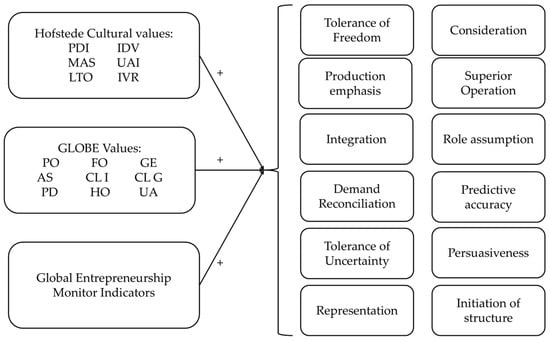Abstract
: With global leadership as the new norm, discussion about followers’ preferred leader behaviors across cultures is growing in significance. This study proposes a comprehensive predictive model to explore significant preferred leadership factors, drawn from the Leader Behavior Description Questionnaire (LBDQXII), across cultures using automated machine learning (AML). We offer a robust empirical measurement of culturally contingent leader behavior and entrepreneurship behaviors and provide a tool for assessing the cultural predictors of preferred leader behavior to minimize predictive errors, explore patterns in the data and make predictions in an empirically robust way. Hence, our approach fills a gap in the literature relating to applications of AML in leadership studies and contributes a novel empirical method to better predict leadership preferences. Cultural indicators from Global Leadership and Organizational Behavior (GLOBE) predict the likelihood of the preferred leader behaviors of “Role Assumption”, “Production Emphasis” and “Initiation of Structure”. Hofstede’s Long-Term/Short-Term Orientation is the most critical predictor of preferences for “Tolerance of Uncertainty” and “Initiation of Structure”, whereas the value of restraint impacts the likelihood of preferring leaders with skills in “Integration” and “Consideration”. Significant entrepreneurial values indicators have a significant impact on preferences for leaders focused on “Initiation of Structure”, “Production Emphasis” and “Predictive Accuracy”. Findings also support earlier studies that reveal age and gender significantly impact our preferences for specific leader behaviors. We discuss and offer conclusions to support our findings that foster development of global business managers and practitioners.



Reading the PDF…
The “most preferred leadership behavior” is … being male?
Uncertainty-avoidance ( that’s a Hofstede dimension, why do they seem to be claiming otherwise? ) is 2nd, which explains why ideology/prejudice, Kahneman1-mind, for anybody who has read his “Thinking Fast and Slow”, on the 2 mind-systems, is preferred to considered-reasoning!
Damn…
Humankind … hasn’t got a chance in hell, … of surviving this century’s challenges,
has it?
That kind of polarization/programming … is completely incompatible with species-wide adapting.
Here are some background links, for you people:
https://en.m.wikipedia.org/wiki/Hofstede's_cultural_dimensions_theory#Dimensions_of_national_cultures
https://en.wikipedia.org/wiki/Global_leadership
I think they really missed a trick, by not looking into whether Kegan4 or Kegan5 is preferred, in leadership, in different cultures ( though Hofstede’s Success-orientation, formerly “masculinity”, would be a reliable indicator for Kegan4 & against Kegan5 )…
Kegan4’s … bulling-boss mode, it’s a stage-of-unconscious-mind-development which is pushing-out-unacceptable-meaning, & its instinct “knows” that validity is zero-sum: anybody else having any validity, that costs one’s own ( exclusive ) validity.
Kegan5’s … systems-of-systems mode.
scroll down a bit, from this link, & read the table…
https://en.m.wikipedia.org/wiki/Robert_Kegan#The_Evolving_Self
Kegan & Lahey’s book “Immunity to Change” is on 3, 4, & 5, & how not getting one’s unconscious-mind to change utterly destroys potential, for little reason.
They provide leverages for getting one’s unconscious to grow-up, too…
_ /\ _